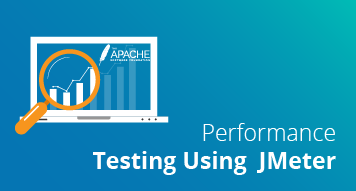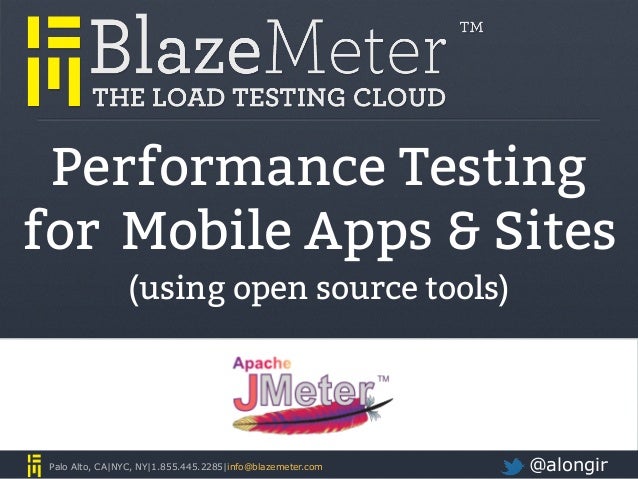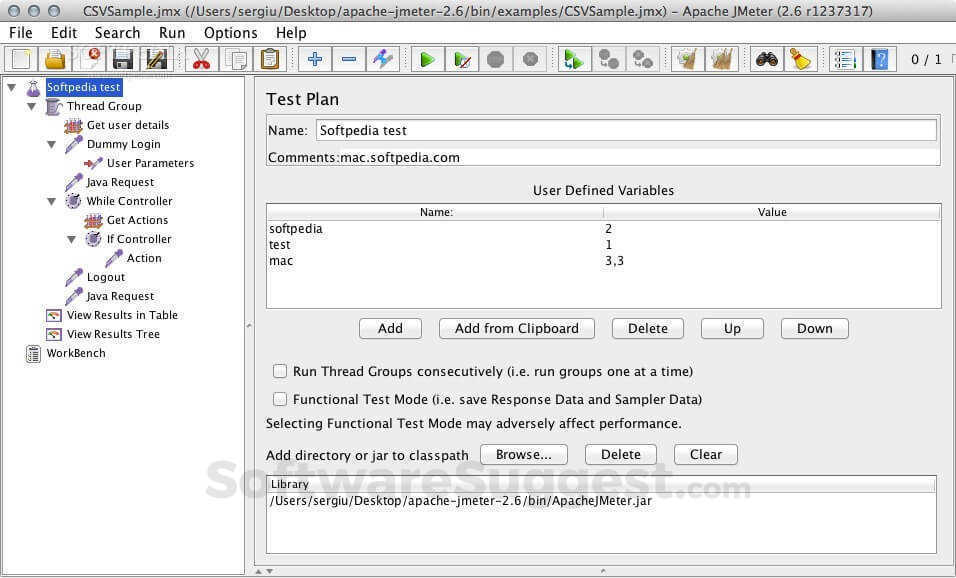JMeter is an Apache 2.0-licensed open-source load testing tool. It provides thread-based load testing. With thread-based testing, we can easily simulate the stress our system would be under when a lot of users use our application simultaneously. JMeter also provides good reporting of the test results. Jmeter-prometheus-plugin - A Prometheus Listener for Apache JMeter that exposes results in HTTP API. Jmeter-prometheus-listener - Apache JMeter Backend Listener implementation for Prometheus metrics exporting. ClickHouse JMeter Results from ClickHouse - Using the JMeter Listener pack, ClickHouse and Grafana to collect and monitor test results. Using JMeter in Linux is the same as in Window; you simply run the following shell script. Run the script file jmeter (This file has no extension)- run JMeter (in GUI mode by default). Run the script file jmeter-server - start JMeter in server mode (calls JMeter script with appropriate parameters). The Apache JMeter™ application is open source software, a 100% pure Java application designed to load test functional behavior and measure performance. It was originally designed for testing Web Applications but has since expanded to other test functions. What can I do with it?
JMeter Training Summary
Apache Jmeter is a popular open-source performance testing tool. This JMeter tutorial for beginners teaches you JMeter basic concepts and advanced level concepts to make you a testing pro.
In this Apache JMeter tutorial step by step guide, you will learn about performance/load testing using JMeter tool.
JMeter Syllabus
 Introduction
Introduction| Tutorial | What is JMeter? Introduction & Uses |
| Tutorial | How to Download & Install Apache JMeter in easy steps |
| Tutorial | JMeter Elements: Thread Group, Samplers, Listeners, Configuration |
| Tutorial | JMeter GUI: Test Plan & Workbench |
| Tutorial | How to Use JMeter for Performance & Load Testing |
| Tutorial | Jmeter Timers: Constant, Gaussian Random, Uniform [Example] |
| Tutorial | How to use Assertions in JMeter (Response Example) |
| Tutorial | Controllers in JMeter: Loop, Simple, Transaction, Module, Random |
| Tutorial | Processor in JMeter: PreProcessor & PostProcessor |
| Tutorial | Jmeter Distributed (Remote) Testing: Master Slave Configuration |
| Tutorial | HTTP Proxy Server in JMeter: Record Example Script |
| Tutorial | Best Practices for your Jmeter Tests |
| Tutorial | 10 Best JMeter Alternatives |
| Tutorial | Top 23 JMeter Interview Questions & Answers |
| Tutorial | Apache JMeter Tutorial PDF |
| Check | JMeter Certification Quiz |
What is Apache JMeter?
Apache JMeter is pure Java-based open-source software designed to load test functional behavior and measure performance. You can use JMeter to analyze and measure the performance of web applications or a variety of services. JMeter was originally used for testing Web Applications or FTP applications. Nowadays, it is used for functional testing, database server testing, etc.

Why Learn JMeter?
JMeter helps load test web servers, websites, and web applications by simulating real-user behaviors and testing environments. JMeter provides a user-friendly GUI, easy installation, testing strategies, simulation, and many other performance testing features. Learning JMeter helps you to ease your Performance testing tasks.


Prerequisites for learning JMeter Tutorial?
This JMeter online guide is designed for beginners with little or no performance/load testing experience. If you are new to testing, you can first take the Software Testing course. However, if you have a basic knowledge of software development and software testing processes, it will help you to learn JMeter easily.
What will you learn in this JMeter Tutorial?
In this JMeter tutorial, you will learn all the basics of JMeter and advanced JMeter concepts like JMeter elements, GUI, timers, assertions, controllers, processors, JMeter interview questions, and more other other interesting topics about JMeter.
YouTube Video:Apache JMeter – Introduction
Overview:
Apache JMeter is an open-source performance testing tool; developed in Java. JMeter does not require any purchasing or licensing cost. It means that you can conduct the performance testing of an application or a software system without spending a single penny on the tool. JMeter becomes a rapidly growing tool due to its unrevealed features which compete for the other licensed tools. To make this tool stronger, Apache JMeter Development Community is continuously working on the requirement raised by JMeter users and provides the useful plug-in. The community also releases the upgraded version of the tool with major updates.
A brief history of Apache JMeter:
Stefano Mazzocchi developed Apache JMeter and the officially released the first version in 1998. Since then it’s features have been growing day by day. JMeter became a Top-Level Apache project in November 2011, which means it has a Project Management Committee and a dedicated website.
Features:
Apache JMeter is a Java-based tool which means it is a platform-independent tool. Any popular operating system supports JMeter without any issue i.e. you can install the JMeter easily. The only one thing which an operating system should have is the supportive version of Java. JMeter has nearly all the basic as well as advanced features which a performance testing tool should have.
Following are some important features of Apache JMeter (as on 01/05/2019):
- Apache JMeter is an open-source tool. It means free to use.
- No additional licensing cost or purchasing the pro version.
- Pure Java-based application, so works on any operating system i.e. Platform Independent.
- Lightweight and easy to install
- No maintenance cost
- Easy to upgrade
- Easy to enhance the features by simply adding .jar file i.e. plug-ins
- No explicit hardware is required (depends upon the load requirement)
- Unlimited User load (Thread) generation capability (depending on LG configuration)
- Simple and User-friendly GUI
- Run in both GUI and Non-GUI mode
- Recording option helps to record the user action on an application
- Supports all the basic scripting features like parameterization, correlation, browser simulation delay in request etc.
- Easy to debug the scripts
- Support Android application performance testing
- Test the performance of both static and dynamic resources
- Supports multiple coding languages like BeanShell, Groovy and JavaScript for scripting purpose.
- Supports protocols like Web/HTTP, Web services, Databases, SOAP, etc.
- It can be integrated with the third-party APM tools like DynaTrace, Applicare, Grafana etc.
- Integration with CI tools like Jenkins etc.
- Drag and drop declarative view for scripts.
- Average reporting pattern (Report in HTML format post 3.0 version)
- Proper documents are available to gain knowledge of the functionality
- Free and Commercial Online supports are available
Limitations:
Along with an ample number of features, Apache JMeter has some limitations too, which are (as on 01/05/2019)
- Limited protocol support
- No dedicated support team
- The script cannot be regenerated
- No Protocol adviser
- Compatibility issue in the existing script while upgrading the version
- No Run time graphs (only available when integrates with some monitoring tool like Grafana)
- Dependency on Beanshell and other coding languages for complex scenario scripting
- GC/Heap memory issue is common while running a test on a limited resource machine.
- Unpredictable issues in distributed testing
- Lack of in-depth analysis features
- Reports having fewer features which make analysis bit difficult
Apache JMeter Official Website
Cached
Apache JMeter is a simple and useful performance testing tool. Most of the product based companies use JMeter to test the performance of their products. But, service-based companies have a different thought and shows less interest to accept JMeter. They still prefer and recommend the licensed tool. Although, it is very well accepted by many clients because it saves money and provides an accurate result. To conclude, Apache JMeter is a well-known name in the Performance Testing world which is ease-to-use, free of cost and of-course good for Performance Testing.
Apache Jmeter Free Download
4 Responses
I have an API which has a HTTP response as Event Stream (SSE events) with content-type–>text/event-stream. the default HTTP request sampler doesn’t support the event stream response. So while execution, jmeter indefinitely wait for the response. How to handle this. I read that custom Java sampler has to created for this. Could you please offer tutorial for this
Hi,
I updated path in environment variables but
I have an issue regarding JMeter in command prompt like as ” findstr’ is not recognized as an internal or external command,
operable program or batch file.
Not able to find Java executable or version. Please check your Java installation.
errorlevel=2
Press any key to continue . . .”please give the reply
Thank u,
With Regards,
Nagamani K